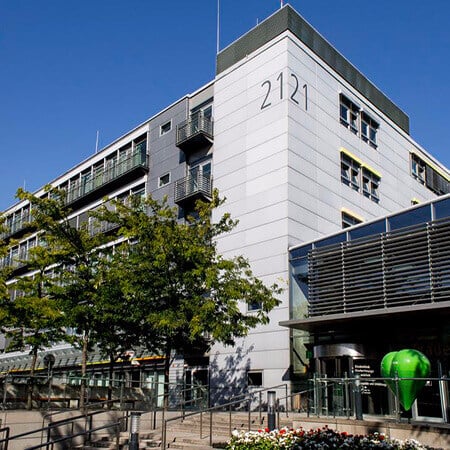Chemotherapy and radiotherapy for Glioblastoma (brain cancer) treatment in the best hospitals in the world
Treatment prices are regulated by national law of the corresponding countries, but can also include additional hospital coefficients. In order to receive the individual cost calculation, please send us the request and medical records.

Department of Radiation Therapy
According to the Focus magazine, the University Hospital of Ludwig Maximilian University of Munich is regularly ranked among the best medical institutions in Germany! The hospital is the largest multidisciplinary medical facility, as well as a leading research and training center in Germany and Europe. The hospital is proud of its bicentenary history and tirelessly confirms its primacy at the national and international levels. The outstanding quality of medical care is complemented by highly productive research activities, thanks to which many effective diagnostic and therapeutic methods, saving people’s lives, have been presented in medical practice.







Department of Radiation Therapy
According to the Focus magazine, the Department of Radiation Therapy ranks among the top German medical facilities in the area of its specialization! The department offers all types of modern radiation therapy for cancer treatment at the highest level of university medicine. The priorities of the department's work include the treatment of tumors of the gastrointestinal tract, urogenital system in men, gynecological tumors in women, oncopathologies of the nervous system, as well as head and neck tumors. Each department's specialist strives to ensure all the patients with the most effective and at the same time customized treatment. Due attention is also paid to radiation protection.






Department of Radiation Therapy, Radiation Oncology and Proton Therapy
The Department of Radiation Therapy, Radiation Oncology and Proton Therapy offers the full range of modern radiation therapy at the highest medical and technological level. Innovative proton therapy is also within the competence of the medical facility. As the largest medical facility of this kind in Eastern Saxony, the department annually admits about 2,300 cancer patients, 550 of whom are treated on an inpatient basis. In total, the department has about 110 employees, including 26 doctors, 14 physicists, 22 radiological assistants, 22 nurses and 28 employees of various profiles (in radiation biology research laboratories and other sections). The department's doctors cooperate closely with oncologists, chemotherapists and other specialists in related fields, since cancer patients usually require comprehensive treatment that combines several methods. In most cases, patients undergo radiation therapy on an outpatient basis, which eliminates the need for hospitalization. The main value of the department's medical team is the patient's health, so doctors always strive to provide qualified medical care that meets the individual needs of the patient.





The exact causes of brain cancer tumors, like with other neoplasms, have not been established yet.
Brain cancer is very variable. The prognosis depends on the histological type, localization, and pattern of tumor growth.
Besides, the age of the patient, the presence and severity of concomitant diseases play an important role. It should be noted that in the era of development of diagnostic methods, the division into "malignant" and "benign" tumors is often conditional. The information on the possibility of a benign tumor becoming a malignant one over time has also been confirmed.
Clinical manifestations of brain cancer
Cancer (glioblastoma) affects the brain in various ways, each of which contributes to the clinical picture.
As the cancer tumor grows, it compresses the adjacent medulla, which leads to certain symptoms. Depending on the location of glioblastoma, these symptoms may include the occurrence of paresis and paralysis, impaired sensitivity, seizures, speech disorders, smell, vision, and cranial nerves dysfunction.
A distinctive feature of intracranial tumors is the fact that their growth occurs in a tightly limited space – the cranial cavity. In this regard, the presence of the tumor eventually leads to an increase in intracranial pressure.
An increase in intracranial pressure leads to the development of general cerebral symptoms (headaches, specifically in the morning, nausea and vomiting, memory loss). It also leads to difficulty in venous outflow, cerebral ischemia, and the development of ischemic cerebral edema. This aggravates intracranial hypertension and forms a "vicious circle".
The primary glioblastoma has the fourth degree of malignancy. The information on the prognosis of radiation therapy or chemotherapy performing, of course, depends on the location of the cancerous neoplasm, the affection of the nearby structures, and other aspects. These determine the possibility of cancer total removal and the effectiveness of modern methods of radiation therapy and chemotherapy. The information on complete recovery from this type of cancer proves its possibility, but in most cases, even with good intermediate results, glioblastoma progresses.
Diagnostics
Brain cancer can be secondary and primary. These categories are different, and they are distinguished according to how and where exactly cancer has developed. Secondary brain cancer is metastatic.
In secondary brain cancer, malignant cells (metastases) enter the brain from other cancer loci in the body and do not develop in the brain independently. Most often, such types of cancer as lung, breast, and kidney cancer metastasize to the brain.
Primary tumors can either grow slowly and gradually or grow rapidly.
Primary tumors develop directly from brain tissues. Most often, when talking about brain cancer, doctors refer to a whole family of formations – gliomas. The statistical information shows that they occur in 80% of brain pathology cases. All cancer tumors of this group are formed not from brain cells, but from the auxiliary ones.
The first stage of the glioblastoma diagnostics is a thorough neurological examination, according to the information of which a list of necessary additional examination methods is determined.
Contrast-enhanced MRI is the gold standard in the diagnosis of intracranial brain tumors. If there are contraindications to MRI, CT scan with contrast is performed. If a metastatic nature of the cancer is suspected, some studies are also performed to identify the primary area of cancer (X-ray or CT scan of the chest, ultrasound of the abdominal cavity, pelvis, or thyroid gland).
To choose the right treatments, it is necessary to have the following information: the patient's condition at the time of tumor detection, MRI/CT scan with or without contrast enhancement, and the results of the examination of related specialists (depending on the localization of the tumor).
Treatment
The main methods for treatment of glioblastoma are:
- Surgery (in many cases it is not effective due to the tumor metastasis)
- Radiotherapy
- Chemotherapy
Brain tumors require precise treatments and care due to their location and proximity to critical structures of the nervous system. With radiation therapy, it is possible to affect brain tumors more radically and precisely.
Standard radiotherapy releases the maximum dose of radiation as soon as it penetrates the skin and continues to emit it as it travels outside the tumor. Proton radiotherapy, for example, reduces the radiation exposure of the unaffected surrounding brain tissue up to 50%.
With less radiation exposure of normal brain tissues and the optic nerve, proton radiation therapy allows patients to experience fewer side effects compared with standard X-rays. Damage to the brain, nervous system, vision, and hearing is minimized, allowing patients to undergo treatments with fewer interruptions or delays.
Proton beam radiation therapy provides lower effects on the brain stem, eyes, and healthy tissues compared to X-rays. Radiotherapy directs the radiation right to the tumor, without unwanted exposure of healthy tissues.
However, radiation therapy for brain tumors has overall benefits:
- Precise effects of radiotherapy on the brain tumor
- High dose per procedure (fewer number of overall radiotherapy procedures)
- Less impact on healthy tissues and critical structures, including the brain, brainstem, pituitary gland, and optic nerve
- Low risk of side effects such as vision or hearing loss, cognitive or motor impairment, and neurological or hormonal disorders
- Reduced likelihood of recurrence
- Radiotherapy can be administered in combination with chemotherapy, hormone therapy, and surgery (before or after)
Surgery and radiation therapy act on a tumor locally. During surgery, the brain tumor is removed; during radiation therapy, tumor cells are destroyed.
Chemotherapy treatments affect the entire body, and act "systemically". Anticancer drugs used in chemotherapy can fight metastases, specifically when cancer cells have spread throughout the body far beyond the primary brain tumor.
The advantage of chemotherapy is in its higher substance dose. However, chemotherapy can be ineffective for certain types of cancer. Besides, chemotherapy requires special equipment and specialists with the appropriate qualifications.
The determination of the optimal dose is key to the success of chemotherapy. The challenge in chemotherapy treatment is to find a middle ground: a low dose will not give the desired effects, and a high dose can cause life-threatening side effects.
Before introducing cancer treatments into the clinical practice, chemotherapy drugs are tested thoroughly. The information on clinical studies of chemotherapy drugs is mandatory before they can be applied. Specific attention is paid to how they are absorbed in the body and how different factors influence their effectiveness.
Rehabilitation period
The recovery process after brain cancer therapy can take a long time. It is necessary to start rehabilitation for people with cancer as early as possible in order to restore lost brain functions effectively.
Neurological examination and the results of functional diagnostic methods (MRI, CT) allow a rehabilitation specialist to establish the nature and volume of postoperative, post-radiotherapy of post-chemotherapy consequences.
Further, the clinician develops an individual program of restorative therapy after cancer treatment with a neuropsychologist, combined with drug neurological therapy and other types of therapy after treatment of glioblastoma. The clinician supervises the work of each of the specialists of the team and unites their efforts to maximize the treatment result for the patient.
Cost of treatment in best hospitals in the world
The cost of treatment in the best-rated hospitals on the Booking Health website is relatively low. You can save up to 40% of the usual clinic’s price by booking your treatment here.
With Booking Health, you can undergo the treatment of glioblastoma at an affordable price. The cost of treatment varies in different countries, as the prices depend on the hospitals, the diagnosis, and the complexity of treatment. The cost of treatment abroad goes as follows:
- Germany – from 24,500 EUR to 45,886 EUR
- Turkey – approximately 21,000 EUR
- South Korea – approximately 25,500 EUR
You can visit the Booking Health website to find out the exact price for your treatment type.
Where can I undergo the treatment of glioblastoma?
The best hospitals for the treatment of glioblastoma are:
- Gamma Knife and Radiotherapy Center Krefeld, Germany
- MediClin Robert Janker Clinic, Germany
- Medicana International Ankara Hospital, Turkey
- University Hospital of Ludwig Maximilian University of Munich, Germany
- University Hospital Frankfurt am Main, Germany
You can check out the full list of hospitals on the Booking Health website.
How can I undergo glioblastoma treatment abroad?
Organizing the treatment of glioblastoma abroad by oneself can be challenging. It is safer, easier, and less stressful to shift some responsibility onto a medical tourism agency that will support you throughout your journey.
We represent the best hospitals in the world, and you can choose which one is right for you. It is practically impossible to do this on your own, as it requires specific knowledge and experience in medical tourism. Clinicians of the best hospitals in the world will do everything to make the treatment as comfortable as possible.
If you want to get more information on hospitals or the cost of treatment, please leave a request on the Booking Health website. We will contact you as soon as possible, and answer all your questions.

